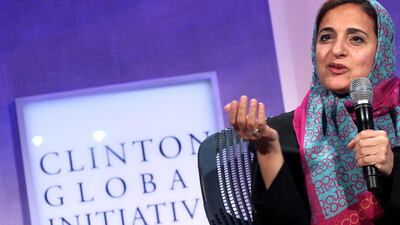From corporate executives to government leaders such as Sheikha Lubna Al Qasimi of the UAE and Queen Rania of Jordan, some of the most powerful women on the planet convened last week to discuss solutions to the world's biggest social challenges.
Among the issues at the top of their agenda: ensuring girls and women gain better access to education, make further inroads into traditionally male-dominated areas of business and, ultimately, secure financial independence.
“We’ve made progress… but we have nowhere, including in [the United States], achieved the kinds of equal outcomes or even equal opportunities that the whole movement has been aiming for,” Hillary Clinton, the former US secretary of state, said during the Clinton Global Initiative’s annual meeting, where leaders from government, business and non-profit sectors came together.
Queen Rania, who spoke alongside Mrs Clinton, added, “In our part of the world we need to understand women’s rights aren’t just rights but requirements for success, whether economically [or] politically.”
During a discussion about female decision-makers in the global economy, Sheikha Lubna – the UAE's first female minister, who now oversees international cooperation and development – noted the importance of incorporating more women into management roles alongside men.
“You can’t have one, and not the other,” she said.
She disagreed with installing quotas, however, “because companies, organisations and entities will start placing women as window dressing, where they’re not effective. I’m a firm believer of putting a woman consciously in an organisation and supporting them to succeed”.
Women make up a little more than half of the world’s population, though their economic contribution remains far below their potential, according to a discussion note released by the International Monetary Fund (IMF) in September.
The IMF also noted that economic growth and stability are necessary for providing women with opportunities to gain financial independence. This may mean facilitating the process by encouraging more women to join the workforce, fostering interest in entrepreneurship and assisting them in starting a new business, experts said.
Other times, it has meant bringing in established female experts in finance to help dig out of economic crisis.
“Look at Iceland—the banks, the funds, the government, everything was taken over by women,” said Christine Lagarde, the IMF’s managing director. “When it’s messy you get the women in, but when the mess is sorted, keep the women.”
Enter Halla Tomasdottir. As the founder and chair of the investment firm Sisters Capital, she has been helping to rebuild Iceland’s economy after it collapsed several years ago. Based on research, she argued, companies can see as much as a 50 per cent higher return on equity when more, rather than fewer, women sit on a corporate board, in part, because they introduce a mix of environmental, social and governance issues that men do not always bring up.
“I don’t think men are worse or women are better, but I think balance is better than lack of balance, and I come from a country [where] the entire financial sector went under, I think, as a consequence of sameness,” said Ms Tomasdottir. “We did not have diversity in the boardrooms at the time, and no one dared to challenge where we were going.”
“I think we are in such a dire state in the world today that if we continue that way the world, or Europe, is going to drive us as far off the cliff as Iceland did.”
Proving greater access to education and mentors was cited by multiple voices from the Middle East and North Africa (Mena) as a crucial factor for breaking down the gender barrier.
“One of the greatest things that has been done in the Emirates is mandating education for women,” noted Sheikha Lubna.
Injaz Al-Arab, which mentors students in Mena through help from business leaders, was highlighted in one session for its work in helping a group of teenage Yemeni girls scale up their venture with advisory support and a US$15,000 grant. The organisation has worked in 15 countries and reached 1.6 million students, said Soraya Salti, a senior executive with Injaz Al-Arab in Mena.
Looking broadly, though, Sheryl Sandberg, Facebook's chief operating officer, warned that much more needs to be done to encourage girls to pursue fields that have traditionally been dominated by boys.
“There’s not equality anywhere,” she said.
“What’s similar all over the world is that men have more resources, men get better education and men are assumed to get leadership roles,” Ms Sandberg said. “It needs to change all over the world in order to solve these problems.”
Executives at some companies discussed ways in which they were trying to even the corporate landscape.
Arne Sorenson, the chief executive of Marriott International, and Irwin Jacobs, the founding chairman of the chipmaker Qualcomm, both discussed programmes that support the promotion of women within their companies. But women still make up only about 35 per cent of leaders at Marriott hotels, and fewer than 25 per cent of all Qualcomm employees.
While Mr Jacobs said he didn’t like the use of quotas to boost the number of women within a company, Ms Tomasdottir noted that she had a change of heart after once also being against this idea.
“We don’t seem to be making progress,” said Ms Tomasdottir, who advocates the use of quotas on corporate boards to introduce more women to the process. “If the commercial and economic data is there, and there’s this added benefit of women bringing other things to the table, why wouldn’t we do it? You make more money.”

